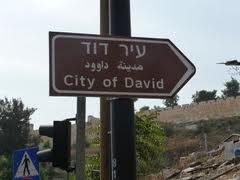I recently visited an astounding site in Israel. It is the ongoing reconstruction and uncovering of the oldest part of the city of Jerusalem, known as the “City of David.” It is the tiny strip of 15 acres on top of a hill where King David built his palace. Other Israelites lived in the area, which was protected by surrounding hills.
Over time Jerusalem moved West, and David’s son Solomon built a great temple on the adjacent Mount Moriah. What was particularly astounding was a tiny artifact found by archaeologists about 6 years ago. It is an ancient seal with the name Gedaliahu ben Pashur who was part of the court of the late king Zedekiah.
The Tragedy of King Zedekiah
Zedekiah ruled when the Babylonians destroyed Jerusalem. His unwillingness to heed the counsel of the prophet Jeremiah and permit the Babylonians to pass through Jerusalem en route to Egypt led to his downfall. He believed he could withstand and defeat them. He was wrong.
The figure mentioned on the seal was a supporter of Jeremiah. He resisted the King’s hubris, urging him to follow Jeremiah’s wise counsel. As a result, his family survived the Babylonian’s sacking of the city, and he was permitted to remain a powerful figure. He is even mentioned in the Bible in chapter eight of the Book of Jeremiah.
An Ancient Prophet
It is he whose wisdom we remember today, not Zedeiah. Zedekiah was not wicked, but he had the wrong kind of courage. He dreamed big, but he refused to listen and heed the warning signals of impending doom. Ultimately, he believed since he was the king, he could do no wrong. He did not need to heed the prophets. He did not need to listen to counselors. One of his ancestors, Hezekiah, had withstood a siege of Jerusalem. Why couldn’t he?
By comparing himself to Hezekiah and believing his status as king allowed him to ignore the voices of caution around him, Zedekiah ensured the destruction of Jerusalem. He reminds us of what hubris can do to a leader, and to his country.
How Countries and People Are Destroyed
He also reminds us of something even more relevant. Destruction is not inevitable. We often bring it on ourselves. We refuse to listen to other voices. We think power or wealth makes us immune from criticism. We forget that our fate is linked with the lives of those around.
Jerusalem, the Jewish sages sought, was not destroyed by the Babylonians or the Romans. It was destroyed by senseless hatred. It was destroyed by hubris.When we do not listen, when we do not adapt, when we do not have the humility to see the presence of God in others, we risk the same fate.
To connect with Rabbi Moffic and receive his weekly digest of Jewish wisdom, click here.


